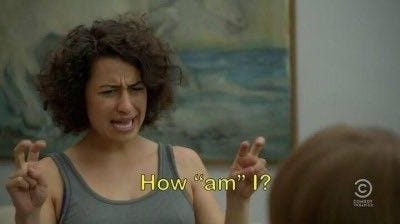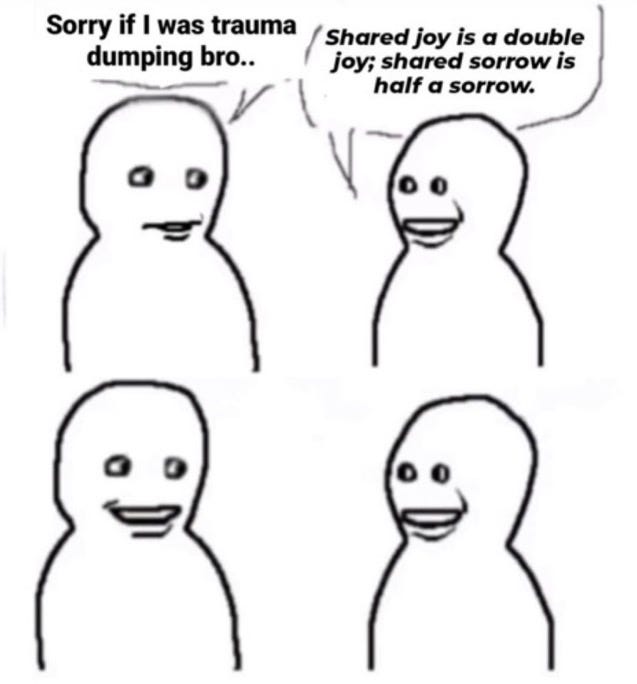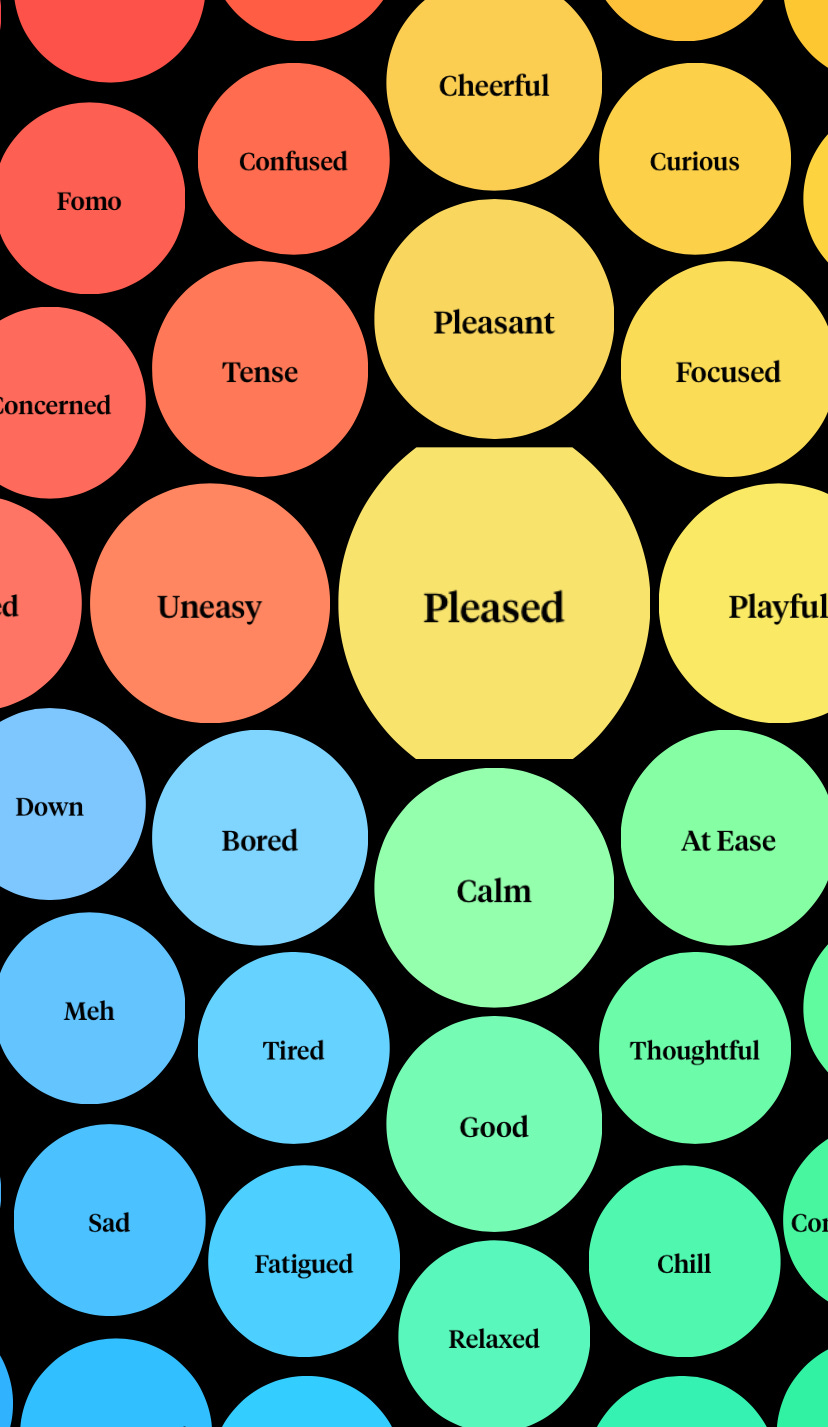How AM I?
“How are you?”
For my subterranean readership, this utterance is one often employed to begin a conversation between two individuals. It usually follows a greeting like “hi,” or “hello,” or maybe even “ahoy” if the inquirer recently returned from a trip to Prague, or if they spend a lot of time on a ship plundering for treasure. It is a question so common that I know how to say it in four different languages (okay brag). The conversation following the question that opened this piece, or the lack thereof, was something I found to be of keen interest at the end of last year. Specifically, I found myself wondering why, exactly, this seemingly simple and yet deceptively deep question very rarely, in my experience, led to any kind of meaningful exchange. It did not take all that long to realize that this pattern was, in part, manifested by my most frequent reply when I was graced with the question. In fact, I found my answer was almost automatic. Before my amygdala could even begin to process what I was feeling, a signal had already been sent from my Wernicke area to my mouth which, in turn, formed my simple answer: “good.”
As soon as I noticed this, I could not stand it. Every time I heard myself using “good” as an answer to any question as to how I was doing, I cringed a bit. Could I not come up with anything better? After all, I had read many books, watched a lot of television, and even earned an advanced education, all of which had left me with quite an extensive vocabulary. Oftentimes, in conversation, others would identify certain words I used as ones they did not hear often. Hell, I even started this very piece by referring to those not in the know as “subterranean” instead of “living under a rock.” Consequently, considering all of the words I know, I couldn’t help but wonder why I was letting myself off the hook. Why was I using such an unremarkable word to describe something as varied and complex as my own emotions?
Speaking of that complexity, my most frequent answer, beyond being a boring one, was often disingenuous. At the time this reflection began, I was, among various other things, settling into a new job, experiencing grief, and navigating the transition of moving to a new city. Therefore, a lot of the time, I was not “good.” There were times I was “devastated.” Other times, I was “exhilarated.” Brought on primarily by these sudden changes, a good amount of fear and loneliness permeated the days and weeks; however, I found those emotions existing alongside a great deal of enthusiasm and accomplishment. In the rare moments wherein I would allow myself to share these intense emotions, I found that being honest often led to those more meaningful connections which I sought. For example, a few days after Thanksgiving last year, I had a nice moment with one of my regulars at work. She asked, quite simply, “how was your Thanksgiving,” and I, going out on a limb, replied, “not great.” In return, she said “I’m sorry to hear that.” Those words were much more impactful than any I had ever received by simply replying “good.” It turns out that she had also endured a tough Turkey Day, and we were able to commiserate over that. Neither of us even shared any specifics as to what had transpired on the holiday; rather, it was enough to simply be able to relate to each other in that very specific way.
This exchange, along with a few others, exposed the power of rejecting the safety I had found in simply saying “good.” Therefore, I figured if I could get myself to more consistently indicate how I was doing with a word other than “good,” then perhaps the conversation starter could actually start more conversations. Thus, a resolution was born!
However, I soon realized I was very out of practice when it came to naming my emotions. To help me navigate this new challenge, I redownloaded an app called “How We Feel.” This app, to which my friend Kat introduced me, is basically a mood tracker. It performs this function by sending users a certain amount of notifications per day. These alerts prompt users to “check in” and choose from a range of over 100 emotions in order to log how they are feeling at that moment. The app includes some common emotions, like “good,” “excited,” and “nervous.” There are also more unique emotions, like “forlorn,” “empowered,” and “repulsed.” With my knowledge of the app’s wide range of emotions, I allowed it to send me three different invitations to check in throughout the day. I figured the more I browsed through their catalog, the more practice I would get at naming my own emotions.
While this app has certainly been helpful in both naming my feelings and recognizing certain emotional patterns, that does not mean I think my resolution is off to a great start. In fact, I am still mostly falling back on “good” whenever people show any level of concern for my well being. Despite my resolve to evolve, I continue to find myself holding back.
A big part of this has to do with the fact that I am mostly asked how I am at work. The trouble with this is that my place of work is one in which I feel almost entirely and unendingly “unpleasant,” to borrow a phrase from How We Feel. This puts me in a predicament because, for instance, when a nosy manager or even a customer asks about my mood, what am I supposed to say to them? Do I honestly tell them I feel “disengaged?” How about “uninterested?” Perhaps I could spice it up and tell them I am feeling “resentful.” If I allowed myself that level of candor, I am not sure how much longer I would have a job. Beyond that, though, as much as, at times, I would like to use words like these ones, I have to wonder how productive something like that would actually be. To quote an episode of Girls, “you have to learn when honesty is righteous and when honesty is nothing more than a party trick.” It’s a question I have grappled with here before: how productive is it to engage in these types of negative feelings?
Additionally, I sometimes find myself questioning how much my coworkers or my customers actually care about how I am feeling. Do they genuinely want to know about my rich inner-world, or have they simply internalized that this question is one we ask each other to be polite? While it does make me squirm a bit to continue saying “good,” it is much more embarrassing to earnestly share my emotions only to discover someone did not actually want to know about them in the first place. This is precisely why I feel so safe in just saying “good.” It’s a way to answer the question while simultaneously indicating that I wish not to discuss it any further. To say something other than that requires a level of vulnerability I am mostly content not to muster, especially in a time, like these last six months, wherein I have been feeling this strange cocktail of emotions which includes, specifically in the past two months, a good amount of melancholy.
Still, though, I view “good” as a way to let myself off the hook. Perhaps the truth of the matter, then, is that I do not want to engage with that melancholy. Somewhere in my subconscious, maybe I have decided that concealing my malaise obfuscates having to confront it in any meaningful way. In other words, if I am feeling “good” all the time, then there are no choices to reconsider or actions to take in manifesting my own happiness.
While the truth probably lies somewhere in between those various possibilities, I do not want to get too down on myself for not making this specific kind of progress toward my resolution. I am reminded of this time I participated in the sacrament of Reconciliation (rebranded Confession, for all my non-Catholics out there) during my senior year retreat. My high school boyfriend and I were newly an item (i.e. two or three weeks) and neither of us had told our families. I was beginning to have some guilt about keeping what felt like a secret, so I talked to the priest about it. To my surprise, after hearing me out, he told me “no one is entitled to your truth,” and that phrase has stuck with me since then. Therefore, like the Oblate did that evening, I want to absolve myself of any guilt that comes from keeping my interiority interior. Furthermore, even if, at times, I find myself not being forthright with strangers and acquaintances, I remain very honest with my loved ones about how I am doing. Additionally, I am probably, at times, a little too honest with you, dear reader. So, in that way, perhaps I am succeeding at my resolution. Even if I am not, it is only May, which means I have six-and-some-change months to share how I feel as I see fit; it does not have to be resolved quite yet.
This week’s recommendations:
This profile on American tennis player, Ben Shelton
Season two of HBO’s Hacks
Season three, episodes one through six of HBO’s Hacks
This profile of Jean Smart of HBO’s Hacks
This podcast interview with Hannah Einbinder of HBO’s Hacks
La Chimera (2023), dir. Alice Rohrwacher
This interview with Alice Rohrwacher about La Chimera





